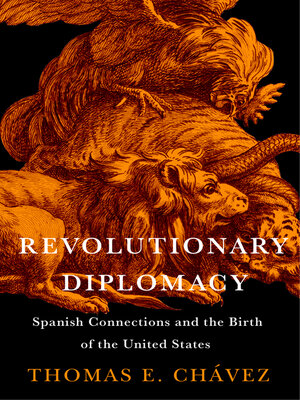Revolutionary Diplomacy
ebook ∣ Spanish Connections and the Birth of the United States · The Revolutionary Age
By Thomas E. Chávez

Sign up to save your library
With an OverDrive account, you can save your favorite libraries for at-a-glance information about availability. Find out more about OverDrive accounts.
Find this title in Libby, the library reading app by OverDrive.



Search for a digital library with this title
Title found at these libraries:
| Library Name | Distance |
|---|---|
| Loading... |
Uncovering the decisive role of Spanish diplomacy in securing American independence
Without Spanish assistance, the thirteen American colonies could not have achieved their independence from the British crown. Alongside the more widely known contributions of France, Spanish men, material, and—most important—diplomatic muscle played a decisive role in the American Revolution.
Using Benjamin Franklin as a guide through the European halls of power, celebrated scholar Thomas Chávez details the tense exchanges, successes, and failures of America's crucial collaboration with Spain during our War for Independence. The Spanish were responsible for driving the British from west Florida, and cities such as Galveston, Texas (named for Bernardo de Gálvez), still testify to the depths of Americans' gratitude.
Chávez also introduces readers to Franklin's fellow American envoys Silas Deane, Arthur Lee, John Jay, and Robert Morris, recounting their dramatic negotiations with the Count of Vergennes, the Count of Aranda, and the Count of Floridablanca at the Spanish court. As Chávez shows, the diplomatic exchanges between the Continental Congress and the Spanish king, made through these pivotal intermediaries, expanded a colonial rebellion into a world war.
Without Spanish assistance, the thirteen American colonies could not have achieved their independence from the British crown. Alongside the more widely known contributions of France, Spanish men, material, and—most important—diplomatic muscle played a decisive role in the American Revolution.
Using Benjamin Franklin as a guide through the European halls of power, celebrated scholar Thomas Chávez details the tense exchanges, successes, and failures of America's crucial collaboration with Spain during our War for Independence. The Spanish were responsible for driving the British from west Florida, and cities such as Galveston, Texas (named for Bernardo de Gálvez), still testify to the depths of Americans' gratitude.
Chávez also introduces readers to Franklin's fellow American envoys Silas Deane, Arthur Lee, John Jay, and Robert Morris, recounting their dramatic negotiations with the Count of Vergennes, the Count of Aranda, and the Count of Floridablanca at the Spanish court. As Chávez shows, the diplomatic exchanges between the Continental Congress and the Spanish king, made through these pivotal intermediaries, expanded a colonial rebellion into a world war.







